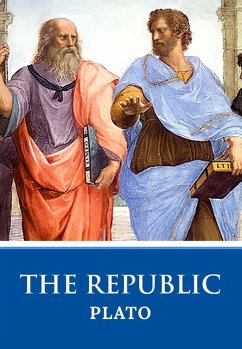The Republic is a Socratic dialogue, authored by Plato around 375 BCE, concerning justice, the order and character of the just city-state, and the just man. It is Plato's best-known work, and one of the world's most influential works of philosophy and political theory, both intellectually and historically. In the dialogue, Socrates discusses the meaning of justice and whether the just man is happier than the unjust man with various Athenians and foreigners. He considers the natures of existing regimes and then proposes a series of hypothetical cities in comparison, culminating in Kallipolis, a utopian city-state ruled by a philosopher-king. They also discuss ageing, love, theory of forms, the immortality of the soul, and the role of the philosopher and of poetry in society. The dialogue's setting seems to be the time of the Peloponnesian War.[
Dieser Download kann aus rechtlichen Gründen nur mit Rechnungsadresse in A, B, BG, CY, CZ, D, DK, EW, E, FIN, F, GR, HR, H, IRL, I, LT, L, LR, M, NL, PL, P, R, S, SLO, SK ausgeliefert werden.


